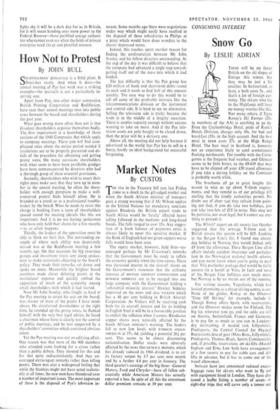How Not to Protest
By JOHN BULL
SHAREHOLDERS' democracy is a fitful plant. It flourishes rarely. And when it does—the annual meeting of Pye last week was a striking example—the spectacle is not a particularly in- spiring one.
Apart from Pye, two other major companies., British Printing Corporation and Rediffusion, have seen their annual meetings turn into public rows between the board and shareholders during the past year.
What goes wrong more often than not is that dissident shareholders organise themselves badly. The first requirement is a knowledge of those sections of the 1948 Companies Act which apply to company meetings. There you will find com- plicated rules about the notice period needed if resolutions are to be properly presented and de- tails of the procedure for obtaining and getting proxy votes. On many occasions shareholders with what seem to have been justifiable grudges have been outmanoeuvred by directors who had a thorough grasp of these essential provisions.
Secondly, shareholders who wish to assert their rights must make sure that they turn up in num- ber to the annual meeting. So often the share- holder with enough gumption to make a well- conceived protest finds himself alone. He is branded as a crank or as a professional trouble- maker by the board. What he needs to resist this charge is backing from a team of shareholders spaced round the meeting (details like this are important). And it is no use having spokesmen who have only held their shares for a few months —as so often happens.
Thirdly, the leaders of the opposition must be able to think on their feet. The outstanding ex- ample of where such ability was desperately missed was at the Rediffusion meeting a few months ago. On that occasion the big insurance groups and investment trusts sent along spokes- men to make statements objecting to the board's policy. They made their remarks, sat down, and spoke no more. Meanwhile the brighter board members made clever debating points at the institutions' expense and quickly robbed the opposition of much of the sympathy among small shareholders with which it had started.
Now Mr John Stanley, who fought so hard at the Pye meeting to retain his seat on the board, was master of most of the points I have made above. He circularised shareholders at the right time, he rounded up the proxy votes, he flanked himself with the very best legal advice, he faced a chairman whose forte is clearly not the control of public meetings, and he was supported by a shareholders' committee which contained obvious talent.
Yet the Pye meeting was not an edifying affair. One reason was that most of the 900 members who attended came looking for a circus rather than a public debate. They shouted for this and for that quite indiscriminately. And they en- couraged extravagant remarks rather than telling points. There was also a widespread feeling that while the Stanleys might not have acted realistic- ally at all times, the new men have blundered over a number of important issues. The most important of these is the disposal of Pye's television in-
terests. Some months ago there were negotiations under way which might easily have resulted in the disposal of these subsidiaries to Philips at a price which would have done wonders to the shares' depressed status.
Indeed, this touches upon another reason for finding the confrontation between Mr John Stanley and his fellow directors unrewarding. At the enil of the day it was difficult to believe that the company had advanced a single step towards getting itself out of the mess into which it had landed.
The key difficulty is that the Pye group has £20 million of bank and short-term debts round its neck and it needs to find half of this amount quickly. The easy way to do this would be to sell off some of the profitable interests like the telecommunications division or the instrument and control side. It is hard to see an alternative. Selling the television side is tricky because the trade is in the middle of a lengthy recession. There is surplus capacity enough without anyone wanting to take on more. And if the Pye tele- vision assets are only bought to be closed down, then the price will be a derisory one.
Above all, the meeting did not help because it advertised to the world that Pye has to sell in a hurry, hardly an ideal background for successful bargaining.














































 Previous page
Previous page